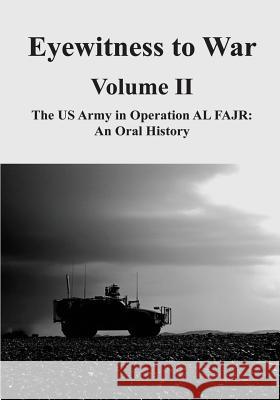Eyewitness to War - Volume II: The US Army in Operation AL FAJR: An Oral History » książka
Eyewitness to War - Volume II: The US Army in Operation AL FAJR: An Oral History
ISBN-13: 9781494413071 / Angielski / Miękka / 2013 / 330 str.
Eyewitness to War Oral History Series: Eyewitness to War The US Army in Operation AL FAJR: An Oral History is a unique publication for the Combat Studies Institute. This study is a derivative of the CSI Operational Leadership Experience (OLE) project, a program that collects and archives first-person experiences from the Global War on Terror. It can also be considered a companion to the recently published CSI Occasional Paper #20: Operation AL FAJR: A Study in Army and Marine Corps Joint Operations. Interviews collected for the OLE project formed the basis for that occasional paper and were so compelling, we felt a need to publish those interviews in a book series. In November 2004, the second battle for Fallujah was a brutal and bloody fight so characteristic of urban terrain. Under the overall command of the 1st Marine Division, four Marine infantry and two US Army battalions (Task Forces 2-2 Infantry and 2-7 Cavalry) were committed to the streets of Fallujah. At this same time, the Army's 2d Brigade, 1st Cavalry Division formed a cordon to hold and isolate the insurgents in the city. Using the fi repower and mobility of the Army's heavy armor and mechanized units to full effect, the Marine Regimental Combat Teams were successful in destroying the enemy and securing Fallujah in ten days. Eyewitness to War interviews span a wide spectrum of participants, from commanders and senior non-commissioned officers at all levels to the first-hand accounts of combat and combat service support personnel on the battlefield. We make no claim that this history is a comprehensive work, as these 37 people are but a fraction of the thousands who took part in the operation. This is primarily an Army oral history, though one of the Marine Regimental Commanders agreed to provide his story. The USMC bore the brunt of fighting in Fallujah and this study does not attempt to overlook their tremendous accomplishments. The individuals featured in this work volunteered to work with our staff over many months. Their stories are a tremendous testimony to the skill, flexibility, and bravery of the US Army today. This collection of personal experiences is the raw material history is made of. It is a riveting and useful way to study the past. And it is our hope that the insights derived from their roles in the second battle for Fallujah will better prepare the US Army for tomorrow's endeavors.
Zawartość książki może nie spełniać oczekiwań – reklamacje nie obejmują treści, która mogła nie być redakcyjnie ani merytorycznie opracowana.











